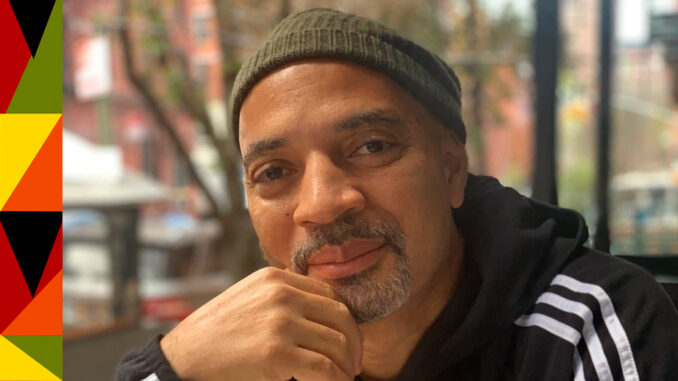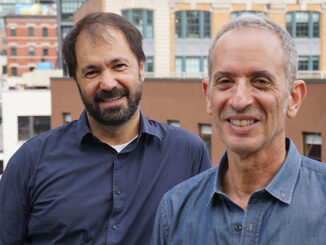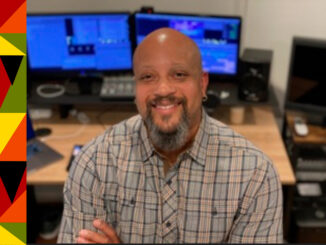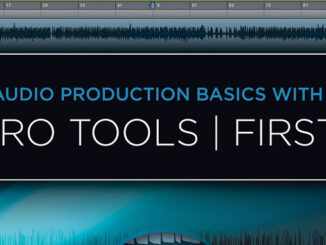
For each day in the month of February, the African American Steering Committee will be highlighting Local 700’s African American members, both past and present, and their accomplishments. We look forward to showing the contributions and influences African Americans have had on the industry.
Name: Hello there, I′m Dave Flynch
What’s your job? Supervising Sound Editor
List of credits you’re most proud of. The projects I have the most affinity for are the independent ones. Films like “Nanny,” “Queen of Katwe,” and “Across the Universe.” I take pride in these films not just for the end product, but for the process, the learning, and the collaboration that went into each one.
What are you working on right now? I’m currently working on “Rez Ball,” a film about a native American high school basketball team. Also, an independent feature by a first-time director.
Who and what are your influences and/or mentors? I owe my journey here to the unwavering support of my family, who have been my rock throughout. Additionally, I am deeply grateful to the Bill Nisselson, the late studio manager of Sound One in New York City, who played a significant role in shaping my career. Bill provided me with invaluable opportunities for growth and development early on. Another influential figure in my journey is Kevin Lee, a distinguished black supervising sound editor in New York, Kevin served as my mentor and guided me along with others, on how to successfully navigate the sound industry. Lastly my time at C5, Inc. in New York allowed me to refine my skills and collaborate with some of the most talented professionals in the business.
What books are you reading? I’m reading “Caste” by Isabel Wilkerson and “Kindred” by Octavia E. Butler right now, and they’re providing some fantastic food for thought.
Shows are you watching and/or movies you’re excited about? On the screen, I’m following “True Detective” and “Fargo,” and I’m eagerly anticipating Ava DuVernay’s “Origin.”
What would be your superhero name? People often refer to my calm laid back demeanor, so maybe Mellow Man.
What are your black history month memories and any cultural or historical impacts on your life? When reflecting on Black History Month, my memories are deeply personal and interwoven with the cultural fabric of our society. I remember the communal pride and collective anticipation as we witnessed the inauguration of President Barack Obama. That moment wasn’t just historical; it was personal. It was a powerful reminder of the progress we’ve made and the work still ahead.
Black History Month is also a time for me to reflect on my own journey in this industry. As a Supervising Sound Editor, I′m reminded of the trailblazers who paved the way for me and the responsibility I carry to mentor the next generation. It′s a month where we not only look back with respect but also look forward with purpose.
What’s the best piece of advice you’ve been given? The best piece of advice I′ve ever received is a two-word mantra: “Be adaptable.” It’s a simple but powerful suggestion that’s helped me navigate many challenges. In our industry, the landscape is constantly shifting—new technologies emerge, creative trends evolve, and every project has its unique set of challenges. Embracing adaptability means staying fluid, keeping an open mind, and being ready to pivot when necessary.
In the editing room, being adaptable might mean reimagining a scene when the initial plan doesn’t quite hit the mark, or it might involve finding creative solutions when budget constraints limit your options. It’s about staying resourceful and inventive, no matter what.
But adaptability goes beyond technical skills—it’s also about interpersonal dynamics. Collaborating with directors, producers, and other editors requires a harmonious blend of vision and flexibility. It′s about listening, truly listening, and then adjusting your approach to support the collective goal.
And in the broader strokes of life, adaptability is about resilience. It’s about facing the unexpected with a steady hand and an open heart. It’s about learning from each experience and using that knowledge to navigate the next challenge more effectively.
To be adaptable is to be prepared for the future, ready for change, and open to growth. It’s a simple piece of advice, but it’s one that has deeply influenced how I approach my work and how I live my life.
If you could time travel, when would you go and why? If I could time travel, my curiosity wouldn′t take me to the past; I′d set the dials forward. I have a deep-seated fascination with the trajectory of our world—where we are heading and how the chapters yet unwritten will read.
Technology is advancing at a breathtaking pace. Each leap forward reshapes the way we create, communicate, and experience our lives. In my field, I′ve seen how innovative software and new techniques have revolutionized sound editing, making the once impossible a reality. I wonder, what will the soundscape of the future be like? Will we have tools that allow us to paint with sound in ways we currently can′t even conceive?
But beyond the tools of my trade, I ponder the societal shifts these advancements will bring. How will technology influence the way we interact, learn, and understand one another? Will it bridge the divides between us, or will it create new ones? As a sound editor, I′m acutely aware that every innovation carries with it the echo of consequence, and I′m eager to hear the reverberations of our technological progress.
When it comes to our society′s view on race, I am both hopeful and curious. In my lifetime, I′ve witnessed remarkable milestones and heartbreaking setbacks. The dialogue on race has evolved, taking on new dimensions and complexities. If I could, I′d travel to a point where this evolution has matured, where I could see the fruits of today′s struggles and efforts. Has the conversation led to deeper understanding and unity, or does it continue to challenge us?
I′d look to see if the stories we tell in film and media have grown more inclusive and representative of the world′s true tapestry. How are Black individuals and other minorities portrayed? Have we reached a place where diversity is no longer a talking point but a natural reflection of our global community?
What’s a little-known fact about you? What are your hidden (or not so hidden) talents? A little-known fact about me? Well, my wife has this running joke where she likens me to a Snapple cap—those caps with surprising facts underneath. I′ve always had a fascination with the origin of things. There′s something about understanding where something started that gives you a greater appreciation for its place in the present. It′s like pulling back the curtain on the world’s mysteries, one story at a time.
As for my hidden talents, I′m not sure they′re so hidden, given my line of work, but I have a knack for storytelling, especially through the lens of history. I′m currently dedicating much of my spare time to a passion project that′s close to my heart. It′s a documentary that charts the influence of black athletes from the 1800s up to today. This project isn′t just about sports; it′s a narrative about America′s struggle with race, seen through the triumphs and challenges of these athletes. It′s about highlighting how their contributions have echoed beyond the playing fields and into the fabric of our society. It′s a story that′s been in the backdrop of America for too long, and I′m committed to bringing it to the forefront.
What’s your favorite (Black) television/movie moment? My favorite moment in black television must be the collective experience of watching “Roots.” As a child, the significance of this miniseries unfolded in our living room, where my family congregated with a sense of purpose as each episode aired. Watching “Roots” became a shared ritual that reinforced our identity and brought us closer. It was a moment when television broke through the barriers of entertainment and became a medium for education and enlightenment.
Was there a television show/movie that inspired you to pursue your career? Absolutely, there was a turning point, it came while watching Spike Lee’s “She’s Gotta Have It.” You see, until that moment, my understanding of movies was that they were distant narratives, stories that were often unreflective of my own reality. But then, along came this film that broke the mold. “She’s Gotta Have It” was a revelation. For the first time on a big screen, I saw characters who walked, talked, and lived in a world I recognized. They weren’t just characters; they felt like friends, neighbors, people I might bump into on the streets. There was an authenticity in their voices, a truth in their stories that resonated with me on a profoundly personal level. But it wasn′t just the characters themselves that inspired me—it was the realization of who was crafting these stories. Spike Lee, with his distinctive vision and unapologetic narrative, illustrated the vast possibilities of filmmaking. He didn’t just create a movie; he created a movement, showing us all that our stories were not only worth telling but also capable of captivating a wider audience.
What’s your personal/professional mantra? My mantra, both on a personal level and in my work, is straightforward: treat others how you want to be treated. It’s about fairness and respect. In the studio, this means listening to the team, acknowledging everyone’s input, and ensuring that we’re all working together effectively. It’s not about being nice—it′s about creating a productive environment where people feel valued, and ideas can thrive.
Professionally, this approach builds trust. When people know they’re respected, they’re more likely to bring their best to the table. It also means taking the time to understand the characters and worlds we’re bringing to life through sound, ensuring they’re as authentic and well-crafted as possible.
In day-to-day life, it reminds me that every interaction is a chance to leave a positive impact, no matter how small. It’s a practical approach to living and working that can lead to real, tangible results and a better, more understanding environment for everyone.
What would be your dream project to work on? I am eager to be involved in a project that offers the chance to innovate with sound. This would challenge me to develop soundscapes that not only align with the narrative but also venture beyond the limits of conventional sound design. A production under the guidance of Ava DuVernay is particularly appealing, as her skill in merging narratives with social awareness results in impactful stories that connect profoundly with audiences.





